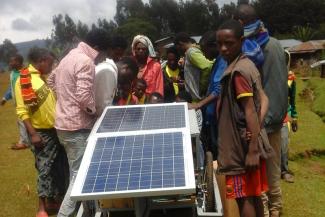Photovoltaics
“I see a huge potential”

What role does solar energy play in providing electricity to rural people in Ethiopia?
Most of Ethiopia is rural, and most people do not have access to the national power grid. Only a small minority can afford diesel-generators, which are expensive. Moreover, diesel is not always available. Accordingly, stand-alone photovoltaic systems that need no connection to the national grid are very useful. At the moment, more than 13,200 stand-alone PV systems are installed in the country.
Does such off-grid technology help to create jobs?
I see a huge potential. These applications serve small-scale enterprises. For example, farmers can run small flour mills with solar power. They become able to sell flour in local markets and not only grain, which is less valuable. Moreover, they can operate off-grid water pumps. They can also use appliances like this to serve other farmers and charge money for such services. Some villagers have solar kiosks and recharge mobile phones and other devices. They also sell cooled beverages. PV systems allow rural people to offer and enjoy options that used to be available only in urban areas. In a village near Arba Minch, we introduced a solar-powered hair saloon, and it was full of customers right from the start. PV definitely improves opportunities for earning money – as well as the standard of life in general.
Are PV systems and components manufactured locally?
Well, in the long term, as the market grows, I think there will be scope for local production of at least some components, so additional jobs will be created that way. At the moment, most components and systems are imported from Europe and China.
In advanced countries, prices for PV systems have dropped dramatically in recent years. Has the technology become affordable in Ethiopia?
Yes, prices have been coming down fast. Today, you can get a 60 Watt system for 12,000 Birr or so, that is the equivalent of € 450. One year ago, the price was around 20,000 Birr. Per kilowatt hour, off-grid solar power now costs not quite 10 Birr. That is much cheaper than diesel-generated power, which costs more than 30 Birr per kilowatt hour. A small enterprise that invests in a stand-alone system can break even in one to two years.
That sounds good, but can rural people afford such investments?
Well, in some places people have access to micro-finance institutions (MFIs), and the interest rates they pay are 10 % to 15 %. However, the micro-finance system needs to be expanded to the entire country. Moreover, many small businesses struggle to meet MFI conditions. For instance, some MFIs expect entrepreneurs to already have at least 20 % of the capital needed. On the other hand, many rural people do not have a registered address, which is another thing MFIs require. Lots of poor people do not even have documents that would prove that they own their homes.
Could the government do something to make funding more easily available?
In view of people’s poverty, it would be great if the government would grant direct funding. But it has been helping in other ways. Solar systems are exempted from taxes and import duties. That really matters.
How important are education and advanced training?
Education is crucial. So far, many people simply do not know much about off-grid power supply. Ethiopia’s Ministry of Energy has started to support advanced training for solar electricians. Foreign agencies are also contributing to raising awareness in rural schools or health centres. It is vitally important to reach out to the rural population. Solar systems are easy to operate, but one must command some basic skills and understand the technology.
What is Arba Minch University doing in this field?
Four years ago, we set up a solar competence centre in cooperation with Sahay Solar Africa, a German non-governmental organisation. We are training engineers and electricians. So far, we have trained over 300 students. We also go out to the rural areas and teach local people. In cooperation with Neu-Ulm University of Applied Sciences, we are running an applied entrepreneurship education programme (AEEP). The goal is to develop new business ideas based on off-grid applications. The German Academic Exchange Service (DAAD) and private companies are involved in the programme too. We want to incubate new businesses in cooperation with German partners. The focus is on business and management aspects, whereas our competence centre is promoting technological skills. Seven of our tutors spent eight weeks in Neu- Ulm this year and were taught there. Afterwards, we held courses in and near Arba Minch this summer with around 50 students.
Are there any tangible results?
Yes, there are. Our students have developed several products and business ideas like mobile solar wagons with charging stations, mobile solar photo studios with a laptop and printer or a mobile ice cream machine. They developed a system for franchising those products to local people. We are currently testing the scheme in the area around Arba Minch as well as in Laka, a mountain village some 60 kilometres away from the town. We are getting along pretty well, although we do face challenges such as heavy rainfalls and flooded streets in the mountain areas.
Is the involvement of private-sector companies important?
Yes, it is a crucial issue. It helps us that we can build on practical experience of companies like Phaesun from Germany. Phaesun specialises in off-grid systems and has been active in Ethiopia for some time. It inspires our students to see that PV is indeed commercially viable, even at an international level.
Engidaw Abel Hailu heads the Solar Competence Center at Arba Minch University in Ethiopia.
engidawa2001@gmail.com







